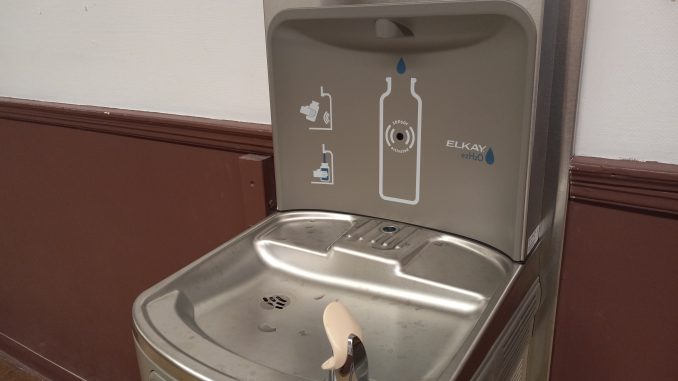
By Radwan Farraj
New bottle stations are set to replace older water fountains found across the Brooklyn College campus as part of an ongoing plan to make CUNY environmentally sustainable.
Starting in 2007, the Sustainable CUNY initiative oriented colleges to take action on climate change and evaluate how each individual campus can make sustainable improvements. Brooklyn College started its 10-Year Campus Sustainability Initiative in 2010 under former President Gould’s administration and aims to continue increasing the number of bottle filling stations available on campus to combat the creation of plastic waste. The bottle stations around campus have already produced significant results, with 15 of these bottle filling stations being responsible for diverting over 375,000 plastic bottles from entering landfills, according to Pietras.
“Facilities has purchased over 150 filling stations, replacing fountains as resources allow. The stations deliver cold water from the New York City water system, which is considered to be one of the highest quality municipal water systems in the United States,” said Pietras in an email to The Vanguard. BC has already installed 18 of these bottle filling stations, with nine installed prior to the pandemic.
In a poll conducted by The Vanguard to assess what BC students thought of the water fountains and bottle stations in general, nine of 16 total respondents answered that they were concerned about the maintenance and upkeep of the fountains and bottle stations on campus. Of those same 16 respondents, another nine also indicated that they trusted the drinking water that came from fountains and bottle stations on campus.
“I think they’re a good investment but I think they need to be tested a little bit,” said Raizy Kipperman, a sophomore at BC. Kipperman noted that part of her skepticism about the drinkable water on campus is based on the lack of information available to students. “I have no idea whether there’s a filter or not. I don’t wanna drink something … that has absolutely no filter,” she said.
CUNY is working to minimize the threat of contamination in accordance with the New York City Department of Health and Mental Hygiene, the DEP, and Department of Education, according to Pietras.
“The New York City Department of Environmental Protection (DEP) regulates and polices the watershed that surrounds and protects our reservoirs, and the water is tested more than half-a-million times a year at various points throughout the system,” Pietras explained with regards to contamination concerns.
Some of this testing includes measures to detect lead, especially since young children are susceptible to lead contamination. “We are required to check lead levels in the drinking water associated with the early childhood center as a part of their license renewal,” said Pietras.
